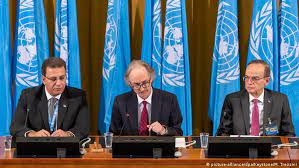Since the inconclusive 21st “Astana” round in January, discussions regarding the “Geneva track” and the resumption of the suspended “Constitutional Committee” meetings have gained traction. These meetings were last held in June 2022, amidst a climate of tense Russian-Western relations and Moscow’s “special military operation” in Ukraine three months prior.
The strongest indication of renewed activity came from Russian envoy Alexander Lavrentiev, who hinted at the possibility of resuming international efforts in March while emphasizing the need for a new meeting venue.
UN envoy Geir Pedersen likely held the 21st “Astana” round despite “the lack of sufficient preparations,” according to Russian officials. They added that “Moscow does not want to be an obstacle to the efforts” undertaken by Pedersen. While Pedersen might have been aware of the limited potential outcomes of the “Astana” round, he likely saw it as an opportunity to pave the way for a return to the international path.
Adding to the complexity is Turkey’s perspective. They view “Astana” as a burden on their role in the Syrian settlement and “Geneva” as marginalizing them due to its intricate international dynamics. This viewpoint further complicates the already delicate international balance.
The recent cancellation of Russian President Vladimir Putin’s visit to Turkey signifies simmering tensions, further amplified by Turkey’s recent financial restrictions on Russian entities. These restrictions directly impact Moscow’s reliance on Ankara to circumvent Western sanctions.
Possible motives for Turkish engagement could include seeking US approval for a new operation against the SDF militia through renewed Geneva engagement or potentially pressuring the US for withdrawal from eastern Syria.
Should Turkish positions remain unchanged, we may witness a new round of “Constitutional Committee” meetings, potentially driven by a competitive Russia eager to counter its Turkish counterpart.
Despite the numerous complexities involved, reopening the “Geneva track” offers a glimmer of hope for Syrian political progress. However, navigating the delicate relationships between regional and international actors remains crucial for any chance of success.
This article was translated and edited by The Syrian Observer. The Syrian Observer has not verified the content of this story. Responsibility for the information and views set out in this article lies entirely with the author.


